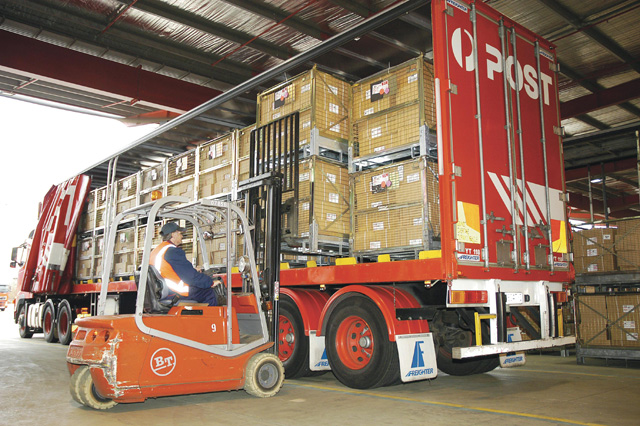 Forklifts are vital in the handling of air freight |
The volume of air freight handled at Melbourne Airport is expected to increase dramatically once the A$330 million expansion project, announced last week, is completed in 2011.
The project, which will begin later this year, will add 25,000 sqm to the terminal and provide 1,000 jobs. The changes are expected to ease congestion at the airport, which is expected to handle 8 million passengers a year by 2020, almost double current levels.
Already, the airport handles some 350,000 tons of air freight a year - more than 30% of Australia's freight market.
Spokesman Tom Perry tells
Forkliftaction.com News that the project will result in a significant increase in international passenger air services, with five new international aircraft gates being added to the terminal, including three that can serve the double-decker Airbus A380.
Among the freight operators with airside access are Australia Post, DHL, Australian Air Express International, Menzies and Toll. The Melbourne Airport Business Park, a 386,000 sqm facility, caters for warehousing and logistic tenants such as AAE Domestic, Bax Global, Gibson Freight, Jets Transport, Star Track Express, Caterpillar, GMC Powertools, Kathmandu, Laminex, Reject Shop and Willow Ware.
According to Perry, a large number of organisations are choosing to locate their businesses at Melbourne Airport because of the ease of access to international and domestic air freight options, combined with access to key arterial roads such as the Hume Highway, Tullamarine and Calder Freeways.
One of Australia Post's three major processing facilities in Victoria is the Melbourne Gateway Facility. Based at the Melbourne International Airport, this facility handles approximately 72,000kg of freight per day. Nine forklifts are used in the facility, and play a vital role in its operations, which involves the handling of interstate and intrastate Express Post items, as well as international inbound and outbound items.
Last week, Australia Pacific Airports Corporation (APAC), the operator of Melbourne and Launceston Airports, announced a post-tax profit of A$158 million, an increase of 1% on the previous year.
APAC's operating profit increased by 10% to A$270 million. Overall, revenue was up 10% to A$384 million, driven by a strong performance of the Australian domestic air travel market, significant growth in the company's property developments, and strong growth in APAC's long term car parks at Melbourne and Launceston Airports.
APAC, which recently entered into its 10th year of operating Melbourne Airport, invested more than A$100 million into capital works at the airport during the 2006/2007 financial year.
A major win for the company during this period was the decision by domestic carrier Tiger Airways to establish its Australian base at Melbourne Airport.